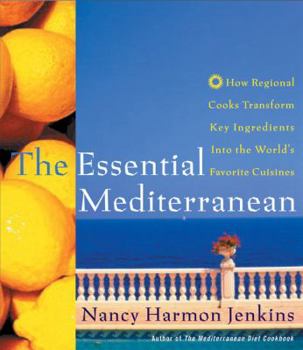The Essential Mediterranean: How Regional Cooks Transform Key Ingredients Into the World's Favorite Cuisines
Select Format
Select Condition 
Book Overview
With The Essential Mediterranean, Nancy Harmon Jenkins continues her lifelong exploration of Mediterranean food -- how it is grown, prepared, and shared around the table. In her latest book, Ms. Jenkins introduces cooks and readers to a cluster of core ingredients and foodways that are fundamental to all of the Mediterranean's diverse cuisines. She shows how the Mediterranean attitude toward food -- a combination of respect, integrity, enthusiasm,...
Format:Hardcover
Language:English
ISBN:0060196513
ISBN13:9780060196516
Release Date:March 2003
Publisher:William Morrow & Company
Length:448 Pages
Weight:2.36 lbs.
Dimensions:1.6" x 7.7" x 9.7"
Customer Reviews
4 ratings
Beautiful book, requiring ingredients not readily available at US grocery stores.
Published by Bontika , 1 year ago
See my headline. This will be a dust catcher.
I only care about the recipes, and these are good.
Published by Thriftbooks.com User , 20 years ago
I have a book on Moroccan cooking by Paula Wolfert and a book on Syrian cooking, and both are daunting to me because of the techniques and equipment required. I consider this book as a bridge into understanding how to cook Mediterranean food. It has the best tabouleh recipe of all time. I look forward to using this as a primer and a reference. From this book I will gain the familiarity with the food in order to cook it well.
Deep Analysis and History of Mediterranean Cuisine
Published by Thriftbooks.com User , 20 years ago
Nancy Harmon Jenkins clearly belongs to the elite cadre of culinary writers who interpret Mediterranean cuisine for us. Foremost among these are Elizabeth David, Claudia Roden, Paula Wolfert, and Clifford Wright. And that doesn't include the many writers specializing in particular countries, such as Penelope Casas on Spain, Diane Kochilas on Greece, and Patricia Wells on France.Each of these writers gives us a slightly different perspective on the same subject, so they rarely overlap in their general essays on the Mediterranean. Roden is the historian, Wolfert is the ethnologist, and Wright is the taxonomist. Jenkins' role seems to be the dietitian and synthesist, explaining what it is that makes Mediterranean cuisine distinctive and, in other works, what makes it as healthy as it appears in demographic studies of peoples and diets.Of all the works I have read by these authors, this book is the most interesting to people interested in history and current events, but with only an average interest in cooking. The primary object of the book is to identify those foodstuffs that are central to the Mediterranean diet, and how they achieved that status. The main characters in this story are salt, olives, wheat and its products, wine and vinegar, legumes, peppers (chiles), tomatoes, pork, seafood, and milk (giving cheese and yogurt).The first item, salt, may seem unexciting since every culture has used and valued salt. But, salt has played a larger role in Mediterranean history than in other cultures because the Mediterranean Sea happens to be a lot saltier than the broader `seven seas'. This means that it is a lot easier to harvest sea salt, which means that salt preserved foods become much more common. A perfect example of how simple things can make enormous differences.Olives and olive oil are a no-brainer and anyone who has read at any length on Mediterranean food will not find a lot of new information here. The chapter on wheat was a major surprise on at least two counts. The first was biological. I knew there was a significant difference between durum wheat and other wheats, but I had no idea the difference was at such a deep genetic level and that durum wheat represents less than 10% of world wheat crops. The second surprise was historical. I am well aware of the difference between soft and hard pastas from the north and south of Italy respectively, but I had no idea that hard pasta (macaroni) was almost entirely limited in its production and distribution to southern Italy until after the end of World War II. This makes it clear that as important as bread is today as a Mediterranean starch, it once was much more important in Italy.Almost every chapter had its little surprises. While I was skimming my way through the chapter on Old World beans, I was surprised by the discovery that there is a significant genetically based allergy to fava beans and that none other than Pythagoras banned their consumption. This may only be exciting to an avid reader
What a beautiful book!
Published by Thriftbooks.com User , 21 years ago
To call this book a "cookbook" is really an understatment- it's an indulgence in the ways of the Mediterranean lifestyle. The delicious recipes are an added bonus. Learn all about the best olive oil to buy, how it's processed, and read Jenkins' interview with an expert on the subject. This is also one of the most beautiful cookbooks I've owned. If you love Mediterranean food and want to know more about the tradtions and history behind it, this is the best book! Makes an impressive gift.






